'We are not asking for justice, we are demanding justice'
By Richard B. Muhammad and Janiah Muhammad -Final Call Staffers- | Last updated: Aug 4, 2015 - 3:50:25 PMPrinter Friendly Page
Miami turns out for a powerful, inspiring evening with Minister Louis Farrakhan
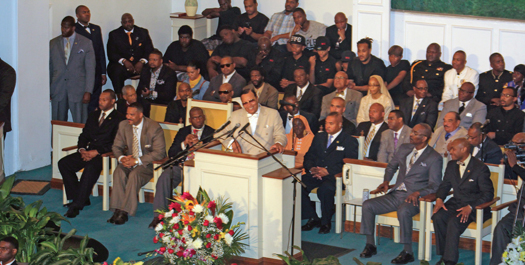
The Honorable Minister Louis Farrakhan speaks to a packed audience inside Mt. Zion Baptist Church in Miami, FL. Photo: Hassan Muhammad
|
MIAMI - When the Honorable Minister Louis Farrakhan stepped before some 1,500 people packed into the historic Mt. Zion Baptist Church the crowd exploded with applause.
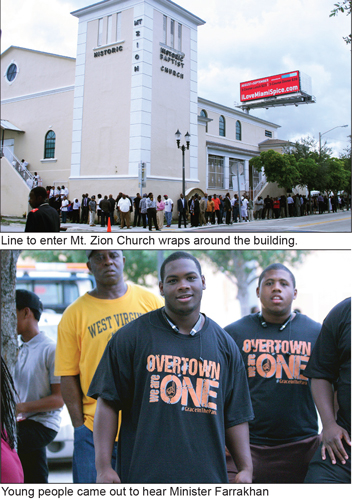
Photos: Andrea Muhammad
|
That same energy pervaded the church where extra chairs were added to a full upstairs sanctuary. Downstairs listeners endured a sweltering heat to hear sound piped in via speaker as event organizers were forced to find a place for people who had come out and refused to leave somewhere in the building.
Then outside others gathered around loud speakers placed outside, sitting on street curbs, on cars in a park across the streets and seemingly anywhere close enough to hear a clarion call for justice.
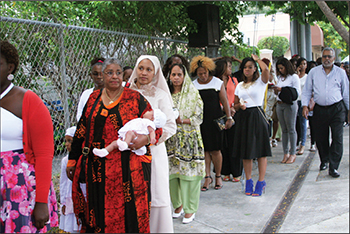
Women in line outside of Mt. Zion Baptist Church in Miami Photo: Andrea Muhammad
|
The gathering will be no frolic, no picnic, no folly, but a serious demand for justice placed before a government rife with injustice and a crisis in police killings of Blacks, Native Americans and others inside America. Such a demand called for an assessment of conditions and confronting White oppression on one side and Black fratricidal violence on the other.
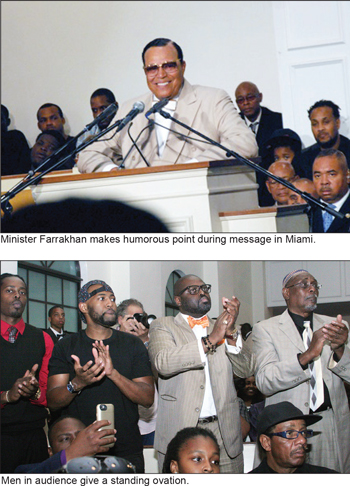
Photo: Richard B. Muhammad, Photo: Andrea Muhammad
|
“We want to go back to Washington to demand of our government what we rightly deserve and what we have paid for with our sweat and our blood,” the Minister declared. “But this time we are not asking for justice, we are demanding justice and as Frederick Douglass says, ‘power concedes nothing without a demand.’ And I added to that, power concedes nothing without a demand that is backed by power.”
“So what is the power that should back our righteous demand for justice? It is the unequaled power of our unity as a people. We have never ‘gone united.’ We stay as little tribes and factions, gathering only for the moment and then scattering after the moment. But when you and I can go as a people, not Muslim and Christian and Baptists, and Methodists, and Crips and Bloods, and native tribes, but go as the original inhabitants of our planet to demand justice and some of this earth we can call our own,” he said.
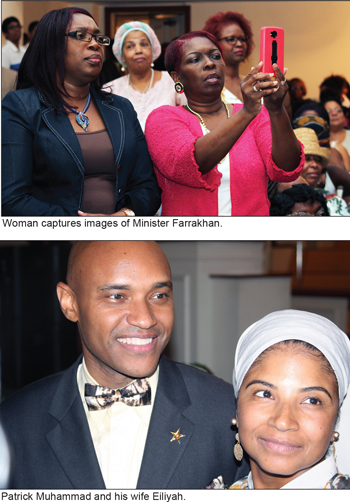
Photo Hassan Muhammad
|
underdeveloped and disrespected community without substantial reinvestment.
Such social engineering leaves Uncle Sam ready to recruit fearless Black youth in the armed forces, and the U.S. government helped foment the crack cocaine epidemic by placing drugs and weapons in the ‘hood to promote fratricide and Black discord, he said. The wise of this nation, and leaders like J. Edgar Hoover, the longtime FBI director, know it is time for the rise of Black people and are determined to avert the destruction and fall of White supremacy, the Minister noted.
But like a serpent, Whites are deceptive, trying to keep control of the once-slaves who are destined to go free by monitoring their activities, their leaders, their actions and even their social media posts to cull information, he said.
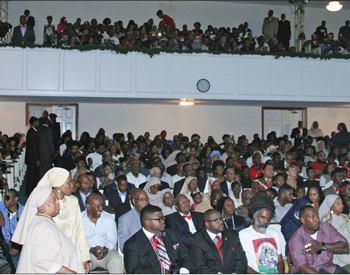
It was standing room only for a Thursday night message from Min Farrakhan in Miami.
|
But, he said the slaughter of Blacks must cease because “we make it so difficult for us to go to Washington with the strength which is necessary to confront the evil of our government in depriving Blacks and Browns, native people and some of their own poor White people.”
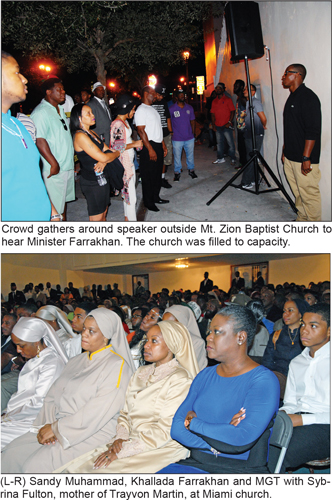
Photos: Richard B. Muhammad
|
Blacks must protect their lives if the federal government refuses to intervene when Black lives are unjustly and the principle of a life of a life is laid out in scripture, the Minister explained. “Death is sweeter than to continue to live and bury our children while White folks give the killers hamburgers. Death is sweeter than watching us slaughter each other to the joy of a 400-year-old enemy. Death is sweeter. The Qur’an teaches persecution is worse than slaughter then it says, retaliation is prescribed in matters of the slain. Retaliation is a prescription from God to calm the breasts of those whose children have been slain. If the federal government will not intercede in our affairs, then we must rise up and kill those who kill us, stalk them and let them feel the pain of death that we are feeling,” said Min. Farrakhan. The crowd rose to its feet and gave another standing ovation.
The Minister again called for a boycott of Xmas holiday spending as a response to oppression and the disrespect of Black life. He cited the last public speech of Dr. Martin Luther King, Jr., in 1968 in Memphis, where the civil rights leader spoke of inflicting economic pain on those who have oppressed Black people. Dr. King was more than a dreamer, he was a freedom fighter who awoke to the American nightmare, the Minister said. The way to inflict economic pain is by withdrawing money from the forces of oppression and using our combined economic might create a reality for ourselves, said Min. Farrakhan. He urged the audience to reject pagan celebrations in the name of Jesus and to spend time with loved ones, not exchanging gifts, but heartfelt discussions about the reality of the man Jesus and his life’s work, the Minister said.
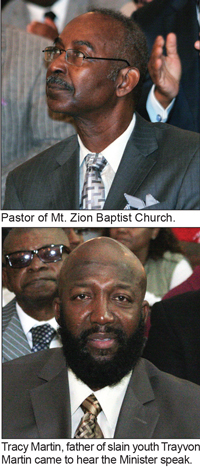
Photos: Andrea Muhammad
|
Though all came to hear Minister Farrakhan, everyone had different reasons or paths that ended July 30 for the Thursday evening message.
Since there was a social media campaign to promote Minister Farrakhan’s visit to Miami, many found out via Facebook and Twitter. “I saw a post from my friend on Facebook that Minister Farrakhan was going to be here, and I was like ‘Oh my God,’ ” said 37-year-old Kirsten Porter, who is from Minneapolis. “I’m hoping to get motivation, inspiration, and spiritual upliftment.”
Some had a direct connection to the Nation of Islam.
Donna Addy, who is originally from Detroit, but now lives in Boynton Beach, Fla., grew up in the Nation of Islam. However, she didn’t continue to attend mosque meetings throughout her life. Over the past few months, she’s been making the hour long drive from Boynton Beach to Miami to attend the Sunday meetings at Muhammad Mosque No. 29.
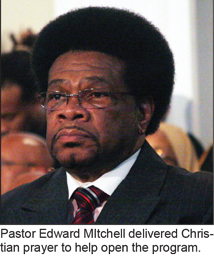
Photo: Andrea Muhammad
|
Asha Starks, a 22-year-old attending Barry University in Miami, felt since she was part of the student movement, she should hear different viewpoints. Her grandfather aided Minister Louis Farrakhan during the Million Man March in 1995, which helped to shape her stance on social rights today.
“We need organization. There’s a lot of messed up stuff, and if we just stand by, nothing can change,” Ms. Starks said.
One of Minister Farrakhan’s main messages during his Justice Or Else tour across the country has been unity. Many say unity is needed in the community.
Patricia Atkinson, a 44-year-old woman born in New York with Jamaican roots, considers herself to be newly conscious. “Unity,” she said. “It’s time. So much is going on. When we have knowledge of self, we can unify. We need to support our own businesses so we can get respect from others.”
Minister Farrakhan has not only been pushing for unity among Blacks, but unity among Native Americans, Hispanics and others who have suffered injustice.
Wayne “Smoke” Snellgrove, a native of Saskatewan, Canada, was a guest of Minister Farrakhan during a leadership meeting for indigenous people and Latinos days before his speech at Mt. Zion Baptist Church. Mr. Snellgrove works for Indian Voices newspaper, which promotes education and public awareness about Native Americans and their issues. He loved what the Minister had to say and wanted more, so he found himself at the church.
“I want to hear more of the truth,” Mr. Snellgrove said. “Any chance I can get to be with and grow with my brothers and sisters, and share my spirituality.”
“I hope to gain motivation to keep fighting for the cause because it gets tiresome,” she said. “You just need to be in the company of other like minds,” said Vanessa Gonzalez, a 31-year-old Latina.
Both Mr. Snellgrove and Ms. Gonzalez say it is time to unite.
“I think 10.10.15 is a great way to be with my brothers and sisters,” Mr. Snellgrove said.
“It’s amazing that it’s been 20 years since the last march,” Ms. Gonzalez said. “I’m grateful I get to participate. It’s sad that we’re still fighting, but at least we have a voice. We need to unify. We can’t call for justice and only have it for one people, only have it for Blacks and Hispanics. I mean, Asians experience injustice, too. We need to unite to win together.”
Once Minister Farrakhan mounted the podium after a deafening round of applause, many got what they came for. Minister Farrakhan not only touched on unity in the community, but he also spoke about unity between the nature of man and the nature of woman.
“He (God) put in the nature of woman a demand,” Minister Farrakhan said. “First, the demand is on the man. The man is supposed to be the maintainer and the provider of the women in his life.”
For a portion of his lecture, Minister Farrakhan focused on the woman and how she should be treated.
“A woman is more than an object of pleasure,” he said. “She is the second self of God and she is a god herself.”
Minister Farrakhan provided all listeners with an empowering and motivating message, letting them know that they have the power within themselves to do great things.
“The Bible calls man not a glory of God, but the glory of God,” he said. “In your best state, you reflect him perfectly. When you look in the mirror, you don’t see that. But that’s not God’s fault. You are a caricature of what God intended you to be.”
The Minister also enlightened many on what being a believer in Jesus Christ really means and dealt with the need for justice.
“The more we are denied,” Minister Farrakhan said, “the longer we are denied, the stronger the answer to that cry.”
Minister Farrakhan urged the audience to study the last few years of Dr. Martin Luther King Jr.’s life before he was assassinated. “They didn’t assassinate him because he had a dream. He was assassinated because he woke up,” he said. “Justice is what Dr. King, Malcolm X, Marcus Garvey and Harriet Tubman wanted.”
In his last public speech, Dr. King talked on the need for land, the need to spread economic pain to those who practice injustice and supporting Black banks and institutions, the Minister observed.
Listeners shot to their feet many times to applaud the Minister’s unique message. After closing out in prayer, several guests left the church talking about what they had heard. Others crowded around the church on the sidewalk and across the street, buying DVDs and books of the Nation of Islam and asking when they could attend the mosque in Miami.
Minister Farrakhan gave listeners many things to think about when it came to improving their lives and the state of their communities. After hearing Minister Farrakhan’s lecture, Britney Stephens left with a better idea of who he is and what he’s about.
“What stuck out to me was that he was talking about how a lot of people say they’re with the Lord, but they’re not in Christ,” she said. “That’s something people have to think about.”
Twenty-seven-year-old Shameka Thomas felt the Minister’s lecture was powerful and intense.
“It’s what we need to wake up, especially about Black men and women and taking back our land,” she said. “His talk about Jesus and how he was a revolutionary and how we’re all one and in Christ and that there is no distinction stood out to me. Christ was about love but also about war.”
After hearing his message, many people was excited to be in Washington, D.C. on 10-10-15.
Arleen White, an activist originally from Jamaica who lost her 14-year-old son to gun violence, felt Justice Or Else is long overdue.
“We really need to unite,” she said. “It’s time. We’ve been victimized for too long and we need to fight for the hour and for our children. Now it’s time for us to really stand up because if we don’t stand for anything, we’ll die for anything.”
For Michael Lowe, it was just nice to see Minister Farrakhan in person.
“I got more of what I’m used to getting from him,” Mr. Lowe said. “Him bringing the truth like he does. I hope to follow him in his footsteps.”
No comments:
Post a Comment